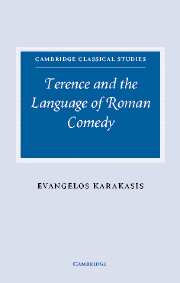Book contents
- Frontmatter
- Contents
- Acknowledgements
- Conspectus siglorum
- Introduction
- Part I Linguistic differentiation in Terence
- 1 Colloquialisms
- 2 Archaisms
- 3 Senilis μακρολογία and περισσολογία
- 4 Hellenisms
- 5 Features of elevated language
- 6 Idiolect
- 7 Plautus in Terence: the case of Eunuchus
- Part II Linguistic and stylistic unity in Roman comedy
- Bibliography
- Index locorum
- Index nominum et rerum
7 - Plautus in Terence: the case of Eunuchus
Published online by Cambridge University Press: 22 September 2009
- Frontmatter
- Contents
- Acknowledgements
- Conspectus siglorum
- Introduction
- Part I Linguistic differentiation in Terence
- 1 Colloquialisms
- 2 Archaisms
- 3 Senilis μακρολογία and περισσολογία
- 4 Hellenisms
- 5 Features of elevated language
- 6 Idiolect
- 7 Plautus in Terence: the case of Eunuchus
- Part II Linguistic and stylistic unity in Roman comedy
- Bibliography
- Index locorum
- Index nominum et rerum
Summary
Introduction
Studies on Terence's style, structure, motifs and characterisation have shown that he stands outside the main tradition of the Roman palliata as exemplified by writers such as Naevius, Caecilius and, most importantly, Plautus. As for Plautus and Terence in particular, it has been argued that these two poets are about as different as two poets working in the same genre can be. This is true up to a point, but there are contexts in which it can be shown that Terence does adopt a more Plautine or traditional style. This seems to be especially so in the case of Eunuchus.
In this chapter, after setting out the generally accepted thematic and structural similarities between Eunuchus and the Plautine corpus, we turn to the possibility of a rapprochement between the two authors on the linguistic and stylistic plane as well in this specific work.
Structural and thematic similarities
Eunuchus is considered by most scholars as Terence's most Plautine play in both context and structure. Apart from its more farcical character, in the Eunuchus we also find several techniques, which, while being very common in Plautus, are, on the other hand, avoided or sparingly used in Terence's plays. This is the case with:
Long inorganic speeches. Unlike Terence, Plautus is fond of including long inorganic speeches, i.e. scenes not closely integrated with the action which hold up the plot. This is mainly the case with the self-introductory monologues of Plautus' parasites (cf. Capt. 69–109, 461–97, Men. 77–109, Pers. 53–80, Stich. 155–233). Gnatho's overheard entrance monologue in the Eunuchus (vv. 232ff. – the monologue lasts for thirty-six lines) is also an extra causam narration, detached from the action, and is much more in the Plautine tradition.
- Type
- Chapter
- Information
- Terence and the Language of Roman Comedy , pp. 121 - 144Publisher: Cambridge University PressPrint publication year: 2005



